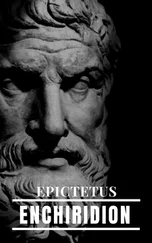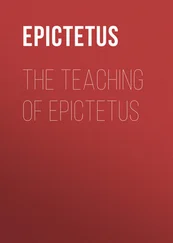24.As expressed, e.g., in Seneca, De Prov. VI. 6: Hoc est quo deum antecedatis: ille exira patientiam malorum est, vos supra patientiam. Cf. also Zeller, 257.
25.I am following here in the main, but not uniformly, Von Arnim's admirable snmmary.
26.This triple division of philosophy, with especial but not exclusive application to ethics, is the only notably original element which the minute studies of many investigators have found in Epictetus, and it is rather a pedagogical device for lucid presentation than an innovation in thought. See Bonhöffer, 1890, 22 ff.; Zeller, p. 769; especially More, p. 107 f.
27.On the use of this term, cf. More, p. 116, 12.
28.Seneca, Ep. 91, 15. "Dass der Mensch ins Unvermeidliche sich füge, darauf dringen alle Religionen; jede sucht auf ihre Weise mit dieser Aufgabe fertig zu werden."—Goethe.
29.Cf. Lagrange, p. 211.—"The school of the philosophers is a hospital" ( cf. Epict. III. 23, 30).
30.More, p. 167, and cf. the whole brilliant passage, p. 162 ff.
31.Cf. Zeller. p. 770.
32. Menschliches, Allzumenschliches , I. 21; 23.
33.See More, p. 168 ff.
34.A Byzantine scholiast in Schenkl² xv.
35."I find in Epictetus," says Pascal, "an incomparable art to disturb the repose of those who seek it in things external, and to force them to recognize that it is impossible for them to find anything but the error and the suffering which they are seeking to escape, if they do not give themselves without reserve to God alone."
36."For it is doubtful if there was ever a Christian of the early Church," remarks von Wilamowitz ( Kultur der Gegenwart ², I. 8, 244), "who came as close to the real teaching of Jesus as it stands in the synoptic gospels as did this Phrygian."
37.The same was done again in the seventeenth century for the Carthusians by Matthias Mittner (1632), who took the first 35 of his 50 precepts Ad conservandam animi pacem from the Encheiridion . See Acta Erudit . 1726, 264.
38.See Zanta's elaborate work upon the share taken by these men in the movement.
39.B. Rand: The Life, etc., of Anthony, Earl of Shaftesbury (author of the Characteristics ), (1900), p. xi.
40.For details see my forthcoming Contributions toward a Bibliography of Epictetus .
41.For some account of a large number of these, see Schenkl², LV—LVIII. Their value is very slight indeed, and only for purposes of emendation, since as yet there seem to exist no authentic traces of the existence of a second early MS. of Epictetus, so that the Discourses must have survived the Middle Ages in only a single exemplar.
Enchiridion , or the Manual
Table of Contents
Table of Contents
This celebrated work is a compilation made by Arrian himself from the Discourses , and the great majority of those who know Epictetus at all have come to do so from this little book alone. That is a pity, because the necessary aridity and formalism of such a systematization obscure the more modest, human, and sympathetic aspects of the great teacher's character. Most of the unfavourable criticism which has been passed upon Epictetus—and there is some of this, although not much—is clearly based upon the occasionally somewhat inadequate impressions which any compendium must produce. For it may be doubted whether even so noble a statement as the Apostles' Creed has ever made a single convert.
Occasionally Arrian has modified to a slight degree the form of statement, as we may observe from the numerous instances, amounting to somewhat more than half of the book, where material from the first four books of the Discourses has been employed; but the substance seems to have been faithfully preserved, wherever it is possible to follow his procedure in detail.
The separate editions and translations of the Encheiridion 1are extremely numerous. Few, however, have been of any notable value, except, perhaps, the celebrated translations by Politian and Leopardi, and Schweighäuser's separate edition of 1798, 2which is still the last independent critical text, 3and has been reprinted by most subsequent editors, even Schenkl, although the latter has added much useful critical material in his notes, especially those which indicate the probable sources of such passages as seem to be derived from the four books of the Discourses , and in particular has arranged the apparatus criticus in more convenient terms.
The sigla which Schenkl has devised for Schweighäuser's apparatus, and which may occasionally be employed below, are the following:
| A |
MSS. in which portions of the Encheiridion precede the corresponding commentary of Simplicius. |
| V |
The ed. of 1528. |
| C |
MSS. containing the Encheiridion alone. |
| V |
The edition of Trincavelli (1535). |
| D |
MSS. of Class B which exhibit the text of the Encheiridion (frequently abbreviated) as lemmata before the commentary of Simplicius. |
| un. |
unus. |
| nonn. |
nonnulli. |
| sing. |
singuli. |
| Nil. |
The Encheiridion in the paraphrase of St. Nilus (Schweighäuser, V. 95–138). |
| Par. |
The Encheiridion in the anonymous Christian paraphrase (Schweighäuser, V. 1–94). |
Table of Contents
1. Some things are under our control, while others are not under our control. Under our control are conception, choice, desire, aversion, and, in a word, everything that is our own doing; not under our control are our body, our property, reputation, office, and, in a word, everything that is not our own doing. Furthermore, the things under our control are by nature free, unhindered, and unimpeded; while the things not under our control are weak, servile, subject to hindrance, and not our own. Remember, therefore, that if what is naturally slavish you think to be free, and what is not your own to be your own, you will be hampered, will grieve, will be in turmoil, and will blame both gods and men; while if you think only what is your own to be your own, and what is not your own to be, as it really is, not your own, then no one will ever be able to exert compulsion upon you, no one will hinder you, you will blame no one, will find fault with no one, will do absolutely nothing against your will, you will have no personal enemy, no one will harm you, for neither is there any harm that can touch you.
With such high aims, therefore, remember that you must bestir yourself with no slight effort to lay hold of them, but you will have to give up some things entirely, and defer others for the time being. But if you wish for these things also, and at the same time for both office and wealth, it may be that you will not get even these latter, because you aim also at the former, and certainly you will fail to get the former, which alone bring freedom and happiness.
Make it, therefore, your study at the very outset to say to every harsh external impression, "You are an external impression and not at all what you appear to be." After that examine it and test it by these rules which you have, the first and most important of which is this: Whether the impression has to do with the things which are under our control, or with those which are not under our control; and, if it has to do with some one of the things not under our control, have ready to hand the answer, "It is nothing to me."
2. Remember that the promise of desire is the attainment of what you desire, that of aversion is not to fall into what is avoided, and that he who fails in his desire is unfortunate, while he who falls into what he would avoid experiences misfortune. If, then, you avoid only what is unnatural among those things which are under your control, you will fall into none of the things which you avoid; but if you try to avoid disease, or death, or poverty, you will experience misfortune. Withdraw, therefore, your aversion from all the matters that are not under our control, and transfer it to what is unnatural among those which are under our control. But for the time being 4remove utterly your desire; for if you desire some one of the things that are not under our control you are bound to be unfortunate; and, at the same time, not one of the things that are under our control, which it would be excellent for you to desire, is within your grasp. But employ only choice and refusal, and these too but lightly, and with reservations, 5and without straining.
Читать дальше












